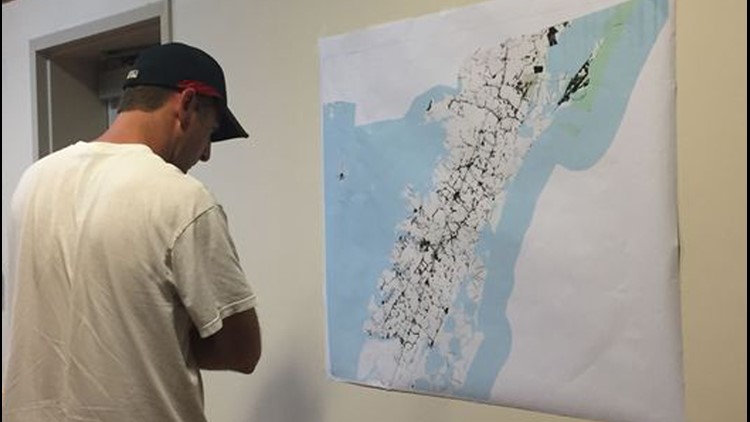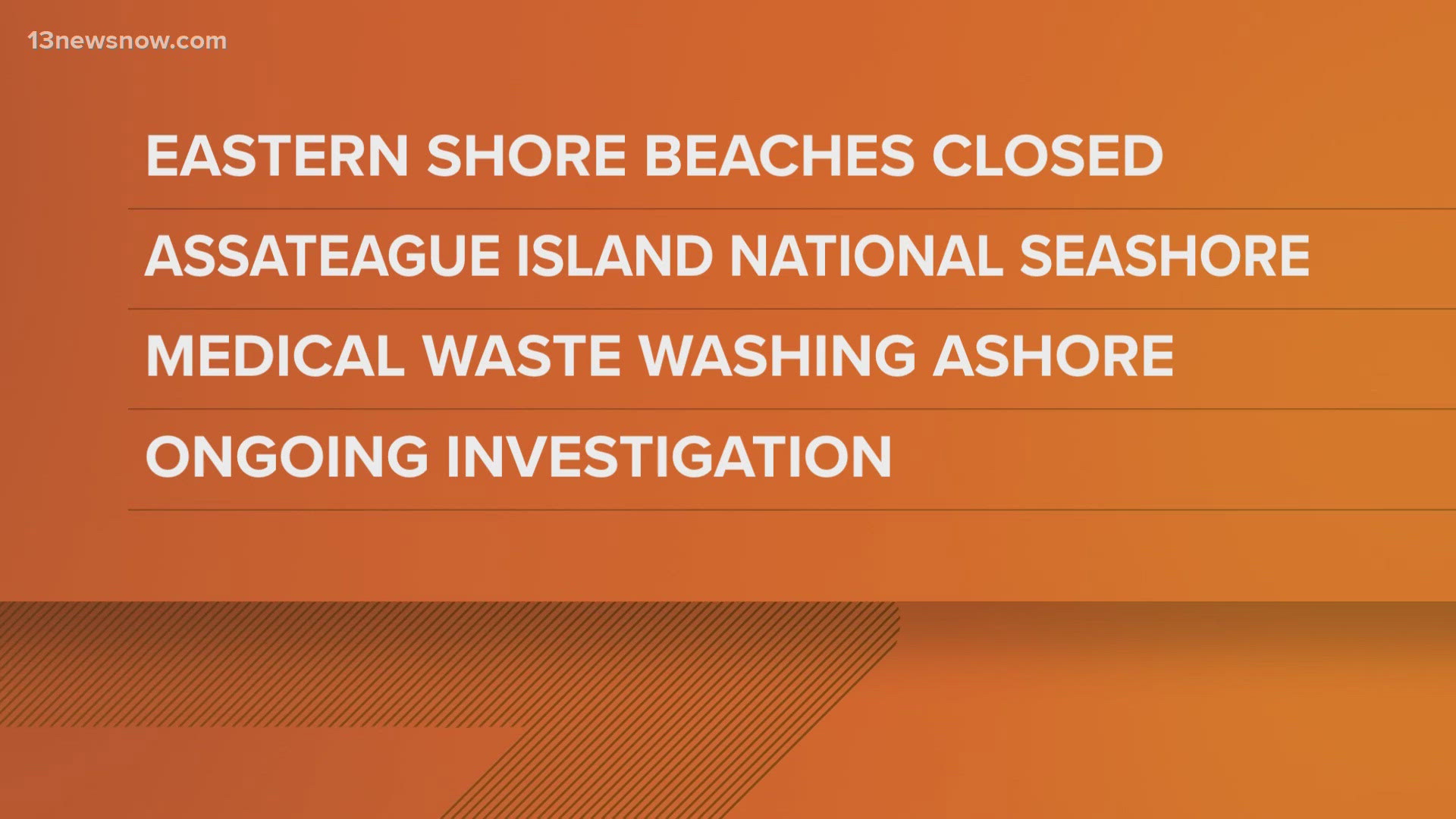EASTERN SHORE, Va., (WVEC) — More areas on Virginia's Eastern Shore soon will have access to broadband internet service, according to the chief executive officer of one of the companies that provides services to the region.
"We started the company with a mission to establish a model for the rural communities that do not have access to broadband to get access to broadband," said Bob Nichols, chief executive officer of Declaration Networks Group, which delivers services under the Neubeambrand.
Neubeam is bringing its service to another 11 locations by the end of August, according to Barry Toser, DNG's executive vice president of sales and chief marketing officer.
Two of the 11 areas, Keller and Pungoteague, were added recently, Toser said.
Coming soon will be broadband service to Airport Road in Melfa; Greenbush; Hallwood; Harborton; Nelsonia; New Church; Onley; Savageville; and Tasley.
The company began providing broadband internet service on Virginia's Eastern Shore in 2015 and has more than 1,000 customers at present.
That number is expected to expand significantly in the near future, according to company officials.
Its coverage at present extends from Cheriton to Parksley.
Existing service areas include: Belle Haven; Cheriton; Craddockville area; Eastville; Exmore; Hungar’s Beach; Keller (recently added); Painter; Parksley; Pungoteague (recently added); Melfa; Morley’s Wharf area; Nassawadox; Quinby; Smith Beach; Vaucluse Shores; Wachapreague; Willis Wharf; and Wilsonia Neck.
The company in Wachapreague recently provided free internet service at the Wachapreague Volunteer Firemen's Carnival — the first time in the carnival's decades-long history the carnival grounds had the service.
Nichols said DNG hopes ultimately to use a similar model to provide broadband services elsewhere in rural America.
"Our company is made up of telecom and internet executives that have a long history of driving new technologies and bringing them to market," he said.
The Eastern Shore of Virginia was the first market the company entered, Nichols said.
It began by establishing an initial network off the Eastville water tower, providing internet to the surrounding area.
Additionally, the company early on did a "point-to-point" wireless shot to several remote bayside areas in Northampton County, including Smith Beach and Wilsonia Neck, among other communities.
"Those were our first communities that we brought up service for," Nichols said, adding, "What we were wanting to demonstrate is, if we can get it done in Smith Beach and Wilsonia Neck, we can probably get it done anywhere on the Shore. We are happy to say those are some of our early customers, most loyal customers, most happy customers."
The company announced in November 2017 it had received a nearly $9 million loan from the USDA to construct a wireless broadband internet system in Accomack County and Garrett County, Maryland.
The awards were financed through USDA’s Telecommunications Program.
That award has been "driving some of the activity over the past six months that we have done expansions to," Nichols said.
The loan will facilitate around 10,000 households in Accomack County getting access to broadband service, he said.
Additionally, Declaration Networks Group Inc. and Microsoft in April jointly announced an agreement to deliver broadband access to around 65,000 people on the Eastern Shore and in Garrett County, Maryland over the next three years.
The plan is ultimately to extend the service area on the Eastern Shore north to New Church, Nichols said, noting the buildout will continue through the next year or so.
Once completed, the company's network will span 60 miles and close to 40 communities on the Eastern Shore, Toser said.
"It's important to let people understand, in these communities that we are going to, that we're accelerating from a position of strength and we've got some major partners behind us that will help us continue moving forward and putting broadband into these areas that have been unserved for so long," he said.
The company uses wireless technologies to extend fiber networks "for a number of reasons," including the ability to rapidly deploy networks and cover wide areas of service, Nichols said.
"Wireless is a very efficient way to cast a broad service area and, with the technology advancements that have happened over the recent years, we are able to provide speed," he said.
The company offers packages at speeds up to 30 megabytes per second to residential users; the most popular are the 10 megabyte packages, Nichols said, adding, "That seems to be very appropriate for the residential user."
The partnership between Microsoft and DNG is part of Microsoft's Rural Airband Initiative, according to a press release.
“This partnership with Declaration Networks will help close the rural broadband gap for 65,000 people living on the Eastern Shore of Virginia and in Garrett County, Maryland,” said Shelley McKinley, Microsoft’s head of Technology and Corporate Responsibility.
Nearly 30 percent of rural Virginians and 6 percent of rural Marylanders do not have broadband access, according to the release. Additionally, more than 19 million people in rural America still do not have access to broadband services.
DNG's role in the partnership is, "we're technologists; we're business folks," Nichols said, adding, "Part of the relationship with Microsoft is focused on those two aspects. They understand this new wireless technology. They also understand the screaming need and pent-up demands in the rural areas for these types of services."
Declaration Networks was formed through a partnership between the company, Google and Microsoft "for this purpose," according to Nichols.
"We were driving, back then, some new wireless technologies to solve the digital divide issue," he said, adding, "What we did is we actually moved into an operational mode in 2015, and now we have looped back around with Microsoft, who has created this Airband initiative to further accelerate these activities."
Nichols said the company is focused on providing commercial services in its current markets — the Eastern Shore of Virginia and Garrett County — but also is looking to expand the model to other rural areas.
In addition to commercial partnerships with local companies, the Microsoft initiative includes offering digital skills training in newly connected communities and access to royalty-free patents, the release said.
"What we are trying to do with Microsoft includes a comprehensive way to address the rural markets," Nichols said, adding DNG was "designed based on this cooperative approach."
"We go into an area that has unserved communities; they have maybe some...fiber facilities that we can directly connect into and then wirelessly distribute in an efficient way," he said, adding, "We are using the latest technologies. Microsoft, through this partnership, is coordinating all the leading technology vendors in this wireless space to drive their product cycles faster, to drive their pricing down, so that it can be more affordable for us, so that we can more liberally deploy networks — so there is a range of things with the Microsoft relationship that we are bringing to bear."
DNG is the first Microsoft Airband partner that came to the relationship having an established relationship with the USDA to support broadband expansion, Nichols said.
As part of the emphasis on training, Neubeam this month is holding the first of a planned series of free computer and internet skills classes on the Eastern Shore.
The hour-and-a-half long classes are geared toward beginners and include tips on safety and maintenance, Toser said.
"What we are trying to do is help people become more comfortable with using devices, more comfortable with using the internet," he said.
The first free seminar was scheduled at Exmore Town Hall on July 26.
"We are anticipating this to be an activity that we will do over and over again in these communities as we open them up," Toser said.



